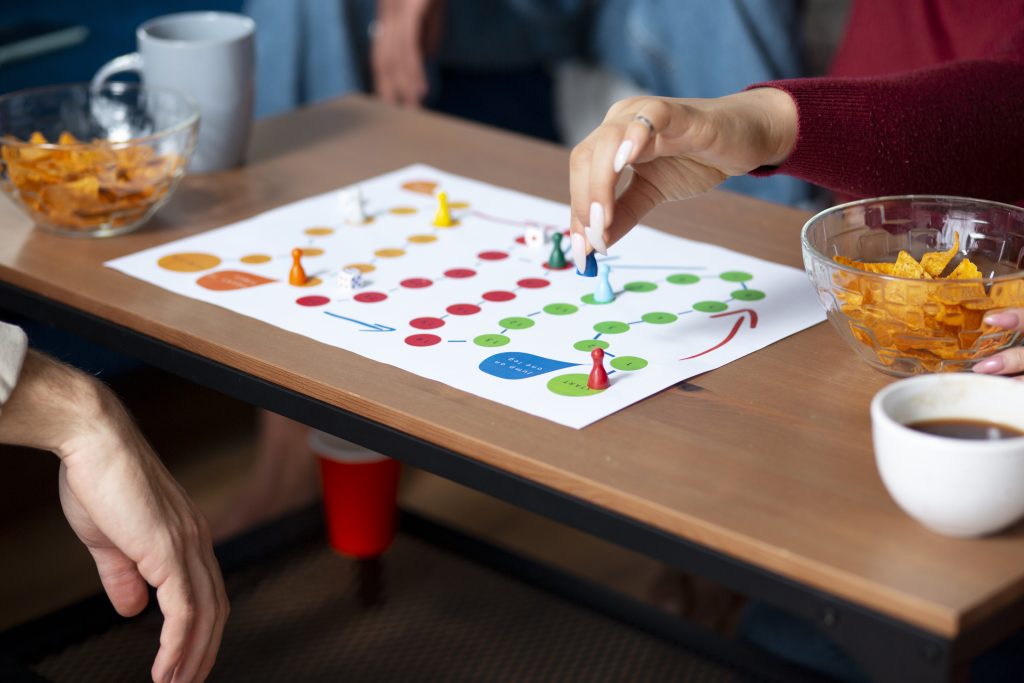Are you tired of searching for a board game that will truly challenge your child’s skills? Imagine a game that combines strategic thinking, problem-solving, and creativity all in one. Picture your child’s face lighting up as they conquer challenges and outsmart their opponents. In this discussion, we will explore the most skillful board game for kids – a game that not only entertains but also engages their minds and fosters essential skills. Get ready to discover the game that will captivate your child’s imagination and provide endless hours of fun and learning.
Scrabble: Vocabulary and Spelling Skills
Scrabble is an incredibly engaging and educational board game that helps children improve their vocabulary and spelling skills. It’s a game that requires word-building strategies and competitive play. As you and your opponents take turns, you’ll have to think creatively and strategically to form words with the letters you have. This not only challenges your spelling abilities but also expands your vocabulary as you discover new words. The game is not only fun but also educational, teaching you while you play.
Scrabble Junior is available for younger kids, allowing them to learn and practice word-building skills at an age-appropriate level. The game promotes family bonding as you gather around the table, engage in friendly competition, and cheer each other on. It’s a great way to spend quality time together while also enhancing your language skills.
Playing Scrabble helps children develop critical thinking and problem-solving skills as they try to come up with the best word combinations. It encourages creativity as players explore different ways to use their tiles and maximize their scores. So grab a Scrabble board, challenge your friends and family, and get ready to expand your vocabulary, improve your spelling, and have a blast while doing it!
Monopoly: Financial Math and Strategic Thinking
Get ready to dive into the world of finance and strategic thinking with the classic board game, Monopoly. Here’s why Monopoly is a great choice for developing financial math and strategic thinking skills:
- Financial Math: Monopoly teaches kids about money management, investing, buying and selling properties, and cause and effect. It provides a hands-on experience in understanding financial concepts and making wise financial decisions.
- Strategic Thinking: Monopoly requires players to think strategically and plan their moves strategically. They have to analyze the board, make calculated decisions, negotiate with other players, and adapt their strategies based on the changing game dynamics.
- Engaging for Both Kids and Adults: Monopoly is a game that can be enjoyed by the whole family. It offers a level playing field for players of different ages and skill levels, making it a great opportunity for family bonding and friendly competition.
- Monopoly Junior: For younger kids, there is Monopoly Junior, which simplifies the game mechanics while still providing a fun and educational experience. It introduces basic financial concepts in a more age-appropriate manner.
With Monopoly, kids can have a blast while learning valuable skills that will benefit them in real-life scenarios. So gather your family and friends, roll the dice, and let the financial adventure begin!
Jenga: Hand-eye Coordination and Problem-solving
Now, let’s shift our focus to another classic board game that not only improves hand-eye coordination but also enhances problem-solving skills – Jenga! Playing Jenga provides a range of benefits for kids, making it a fantastic choice for game night. One of the main advantages of Jenga is its ability to improve motor skills. As players carefully remove each wooden block, they must use their hands and fingers to maintain balance and precision. This helps to develop their hand-eye coordination, which is essential for tasks like writing, drawing, and playing sports.
In addition to improving motor skills, Jenga fosters problem-solving abilities. As the tower becomes increasingly unstable, players must strategize and make thoughtful decisions to prevent it from collapsing. They need to carefully analyze the structure and consider the consequences of each move. This critical thinking and problem-solving practice can be applied to real-life situations, helping children become better decision-makers.
Furthermore, Jenga promotes teamwork and communication. When playing in a group, players must work together to carefully remove blocks and maintain the tower’s stability. Effective communication is key to ensure everyone is on the same page and making coordinated moves. This collaborative aspect of the game encourages children to develop their social skills and learn how to work towards a common goal.
Jenga also enhances concentration and focus. As players take turns and carefully remove blocks, they need to stay focused and pay attention to every move. This helps improve their ability to concentrate for extended periods, which can be beneficial in academic settings and daily tasks that require sustained attention.
Lastly, playing Jenga creates a fun and interactive experience for kids. The anticipation and excitement of watching the tower wobble and potentially collapse bring laughter and enjoyment to the game. It’s a great way to gather the family together and create lasting memories.
Pictionary: Visual Skills and Creativity
Pictionary, the popular drawing and guessing game, is not only a fun-filled activity but also a great way for kids to develop their visual skills and unleash their creativity. Here are some benefits of playing Pictionary:
- Enhances visual skills: Pictionary requires players to interpret and draw visual representations of words or phrases. This helps children improve their ability to observe details and visualize concepts.
- Promotes creativity: Pictionary encourages kids to think outside the box and come up with creative ways to convey their ideas through drawings. It nurtures their imagination and allows them to express themselves artistically.
- Builds teamwork: Pictionary can be played in teams, which promotes collaboration and communication among players. Working together to guess the drawings fosters cooperation and enhances social skills.
- Educational value: Pictionary can be used as an educational tool to reinforce learning in various subjects. It can be adapted to teach vocabulary, science concepts, or historical events, making it a versatile and engaging learning activity.
To improve visual skills in Pictionary, encourage kids to focus on details, practice drawing different objects or scenes, and experiment with different drawing techniques. To foster creativity, provide prompts that encourage thinking outside the box, allow for imaginative interpretations, and create a supportive and non-judgmental environment. Whether played for fun or educational purposes, Pictionary is a game that will entertain, challenge, and inspire kids of all ages.
Taboo: Communication and Imagination
Taboo, the popular word-guessing game, is an excellent way for children to enhance their communication skills and unleash their imagination. In Taboo, players have to describe a word to their teammates without using certain “taboo” words. This game requires effective communication strategies, creative wordplay, and teamwork challenges.
Taboo is an exciting game that exercises children’s imagination through word association games. By thinking outside the box and finding alternative ways to describe a word, children develop their creative thinking skills. The game also encourages them to make quick associations, improving their cognitive flexibility and word recall.
Moreover, Taboo promotes communication skills as players have to effectively convey their ideas to their teammates within a limited time. This challenges their listening skills and encourages them to think on their feet. Through this game, children learn the importance of clear and concise communication, as well as the ability to adapt their communication style to different audiences.
To engage the audience, here’s a table showcasing the benefits of Taboo:
| Benefits of Taboo |
|---|
| Enhances communication skills |
| Triggers imagination and creativity |
| Develops listening skills |
| Adds excitement with time limits |
| Promotes thinking on one’s feet |
Taboo is not only a fun and engaging game but also a valuable tool for children’s development. It helps them refine their communication strategies, exercise their imagination, and build essential teamwork skills. So, gather your friends and family, and let the word association games begin!
Twister: Balancing and Physical Activity
As we move from exploring the benefits of Taboo, a word-guessing game that enhances communication skills and imagination, let’s now shift our focus to Twister, a game that promotes balancing skills and physical activity for children.
Here are four key points to consider when it comes to Twister:
- Benefits of physical activity in board games: Twister is a fantastic way to get kids moving and active. It encourages them to stretch, balance, and twist their bodies, promoting physical fitness and coordination.
- Importance of balance and coordination in children’s development: Twister helps children develop their balance and coordination skills. By reaching for different colored dots on the Twister mat, they learn to control their movements and maintain their balance, which is essential for their overall physical development.
- Ways to make Twister more challenging and engaging: To keep the game exciting, you can add variations and challenges. You can incorporate music and have the players move to the beat, or you can introduce a time limit for each move. These modifications make Twister more challenging and keep children engaged.
- Incorporating physical exercise into board game routines: Twister can be a great addition to a regular exercise routine for children. By incorporating it into their board game sessions, you not only make physical activity more enjoyable but also encourage them to stay active and fit.
Uno: Strategic Thinking and Family Bonding
Uno is a captivating card game that not only promotes strategic thinking but also fosters family bonding. It is a travel-friendly game that can be enjoyed by all ages, making it perfect for family gatherings or game nights. Uno encourages players to think strategically, as they have to decide which cards to play and when to use special action cards. This helps develop critical thinking skills and enhances problem-solving abilities.
One of the major benefits of Uno is its ability to bring families together. Playing Uno creates opportunities for laughter, friendly competition, and quality time spent with loved ones. It allows family members to connect, communicate, and bond over a shared activity. The game’s simple rules and fast-paced nature make it accessible and enjoyable for players of all ages, from young children to grandparents.
Chess: Concentration and Strategic Planning
Chess is a captivating and strategic board game that requires concentration and careful planning. Here are four reasons why chess is beneficial for children’s cognitive development:
- Chess improves concentration and attention span: Playing chess requires players to focus on the game and think ahead, which helps develop their ability to concentrate for extended periods of time.
- Chess enhances problem-solving and critical thinking skills: In chess, players must analyze different moves and anticipate their opponent’s strategies. This promotes logical reasoning and the ability to think critically to overcome challenges.
- Chess promotes strategic planning and decision-making: The game of chess involves making strategic decisions based on evaluating different options and their potential consequences. This fosters the development of strategic planning skills.
- Chess boosts memory and IQ levels: The complex nature of chess exercises the brain and strengthens memory recall. Studies have shown that regular chess play can increase IQ levels and improve overall cognitive abilities.












